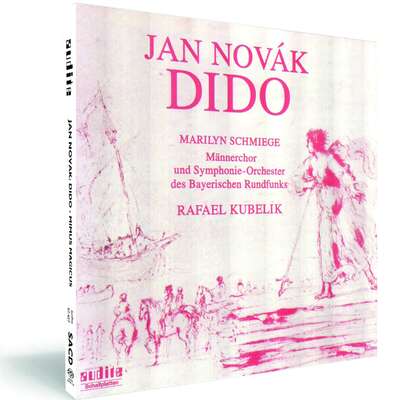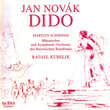
Auto-Rip
With this release works of the important Czech humanist and composer Jan Novák are being made known to a wider public in Germany for the first time. Both compositions are based on texts of the ancient poet Virgil. In DIDO he depicts the torture of an unfulfilled love ending in suicide. Contrasting...more
"Rafael Kubelik hat eine großartige Einspielung vorgelegt. In Marilyn Schmiege begegnet uns eine hochkarätige Mezzo-sopranistin." (Klassik heute)
Details
| Jan Novak: Dido - Mimus Magicus | |
| article number: | 63.413 |
|---|---|
| EAN barcode: | 4022143634139 |
| price group: | BCR |
| release date: | 1. January 1986 |
| total time: | 50 min. |
Informationen
With this release works of the important Czech humanist and composer Jan Novák are being made known to a wider public in Germany for the first time. Both compositions are based on texts of the ancient poet Virgil. In DIDO he depicts the torture of an unfulfilled love ending in suicide. Contrasting with this, Mimus Magicus is the drastically depicted love-magic of a Roman woman who knows very well how to help herself in earthly life. Rafael Kubelik, the Bavarian Radio Symphony Orchestra and the soloist Marilyn Schmiege allow these ancient worlds to be graphically resurrected with a combination of precision and vitality in music making.
Reviews
American Record Guide | 5/2001 | Charles H. Parsons | September 1, 2001
The Czech composer Jan Novak (1921-84) was deeply interested in Latin literature and poetry. For him Latin was still a living language, and he evenMehr lesen
Novak's cantata Dido gets its text from the fourth book of The Aeneid of Virgil. The cantata covers much the same territory as Henry Purcell's opera Dido and Aeneas. It was first performed in 1967 in Brno. A mezzo-soprano (voce media) portrays Dido as a narrator (recitans) tells the tale with commentary by a men's chorus (here the Choro virorum symphoniacisque stationis radiophonicae Bavaricae adstrepentibus). The work bears some resemblance to Stravinsky's Oedipus Rex, with a similar use of a men's chorus and a major role for mezzo-soprano. Novak's narrator plays a much more important role than Stravinsky's. The two works also have a similarity of propulsive rhythms, but in general Novak's music is much more romantic sounding, less detached, less acerbic.
This 1982 performance is a fine one, with Kubelik in firm command, driving the work to its dramatic conclusion. Schmiege may not have the most attractive voice, but she sings most musically, with a warmth and breadth of vocal power combined with dramatic insight. Fiedler was the first to perform the sprechstimme role of Moses in Schoenberg's Moses and Aaron (1954) and he performs here with immense dignity and expression.
The 13-minute Mimus Magicus (1969) is a setting of portions of Virgil's eighth eclogue, Bucolica. Like Dido it deals with love, but instead of seeking death as a remedy for love, the heroine here tries to win back her unfaithful lover through the use of magic spells. Here the musical forces are much reduced, requiring only a soprano soloist (voce acuta), a flute (calamo traverso), and a piano (clavibus pulsatis). Novak does less with these lesser forces, but it isn't quite fair to judge the work on the basis of this inadequate 1986 performance. Soprano (voce acuta) Kurokouchi should be voce acerba! Pitches are woefully misplaced, particular in the higher range, and an acidic quality colors the entire voice. Enjoy the Dido, but this is "Minimus Magicus".
A libretto in Latin, English, and German is included. Even the program notes and performance-recording credits are in Latin!
www.classicalcdreview.com | July 2001 | S.G.S. | July 1, 2001
I acquired this disc under the mistaken impression that the composer wasMehr lesen
Fono Forum | 10/1999 | Matthias Norquet | October 1, 1999 Möglicherweise rehabilitiert
Er lebte und komponierte für die lateinische Sprache. Jan Noväk (nicht zu verwechseln mit seinem ein halbes Jahrhundert früher geborenenMehr lesen
Bei seiner Kantate "Dido" (1967) hat Noväk eine Singstimme von imperialer Couleur vor Ohren, wie sie Marilyn Schmiege in wahrhaft überragender und glückhafter Weise zu Gebote steht. Rafael Kubelik ließ sich während seiner Münchner Chef-Jahre die "own country"-Musik besonders angelegen sein. Auch bei diesem entlegenen Werk spürt man Kompetenz und Hingabe; Orff-Vertrautheit intensiviert antikisches Flair.
Entschieden karger, von einer quasi inneren Unruhe immer wieder ins Presto getrieben, gibt sich die Musik des "Mimus magicus", unmittelbar nach "Dido" wie das Satyrspiel nach einer Tragödie wirkend. Der musikalische Faltenwurf wird hier gegen einen nervös vibrierenden Gestus eingetauscht, welcher die Zauberpraktiken einer eifersüchtig liebenden Frau sinnfällig spiegelt. Eindrucksvoll die Sopranistin Makiko Kurokouchi.









